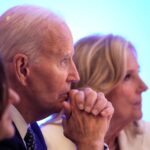“We win; they lose.” That Reagan statement was a declaration for the ages, a denouement to the 20th century, encapsulating what Ronald Reagan did to defeat the Soviet Union and win the Cold War.
There’s nary a Reaganite who doesn’t know it. Few, however, know the full quote and its origins.
It actually went like this: “Dick, my idea of American policy toward the Soviet Union is simple, and some would say simplistic,” Reagan averred. “It is this: We win, and they lose. What do you think of that?”
Dick? Who was that? He was Richard V. Allen. And he died on Nov. 16 at age 88. He was a fan of The American Spectator and a friend of its founder, R. Emmett Tyrrell, Jr.
Above all, he was a remarkable witness to what Ronald Reagan sought and achieved. What follows is the context of that Reagan declaration.
It was late January 1977. It had been mere days since Jimmy Carter had been inaugurated president, setting the stage for a disastrous four years in American history.
Allen, only 41 years old, was already a man of impressive academic credentials and experience in foreign policy — graduate work at Notre Dame, a researcher and policy analyst at the Hoover Institution, the Center for Strategic & International Studies, the Council on Foreign Relations, the American Enterprise Institute, and the Nixon White House.
Now, Allen was contemplating a run for governor of New Jersey. He flew to the West Coast to meet with the former California governor to ask him for his endorsement.
Instead, said Allen, he and Reagan ended up “talking and talking and talking” about foreign policy — for four hours. What Allen most remembered was Ronald Reagan looking him in the eye and boldly asserting that declaration: “We win, and they lose.”
It was an amazing assertion, if not, in retrospect, a prophecy.
I first heard it from Allen in a February 1999 address that he gave in Washington, D.C., sponsored by the Hoover Institution and the William J. Casey Institute of the Center for Security Policy, the text of which was printed by my good friend and colleague Peter Schweizer in his 2000 volume, “The Fall of the Berlin Wall.”
I was researching a book that would eventually become my 2006 work, “The Crusader: Ronald Reagan and the Fall of Communism.” I just had to track down Allen to ask him about that moment. I talked to him on November 12, 2001.
Allen emphasized how utterly groundbreaking Reagan’s thinking was. He had “never heard such words” from anyone in the foreign-policy establishment.
It wasn’t the kind of thing you heard from State Department types or even the Nixon administration, where the policy had been to get along with the Soviets rather than seek to take them down.
Republican Presidents Richard Nixon and Gerald Ford and then Democrat President Jimmy Carter had favored détente — preserving the status quo in Eastern Europe.
Their goal was not liberation but (too often) accommodation. The very notion of victory was absurd.
Allen had never heard anyone dare use the word “win.” “Governor, do you mean that?” Allen asked Reagan, who replied, “Of course I do.”
I asked Allen for added clarification, hoping to document for scholars that Cold War victory had in fact been Ronald Reagan’s precise intention.
I asked him: “Are you telling me that on that day in January 1977, Ronald Reagan told you that his goal was to take on and defeat the Soviet empire? That’s what you’re telling me?” Allen replied: “Yes. That’s absolutely right. That’s what I’m telling you.”
I further pushed: “And Reagan expressed this specific intent to take on and defeat the USSR and the Soviet empire before his presidency even began?” Allen again affirmed: “Yes, that was his intent.”
On that day at Reagan’s home in late January 1977, Allen was so struck that he instantly decided to drop his bid for governor and join Reagan’s crusade to defeat Soviet communism. Four years later, he became President Reagan’s first national security adviser, committing to an effort to do just that — to win.
To be sure, Allen did not last long in that position, for stupid reasons that the New York Times unsurprisingly saw fit to underscore in the lead of its obituary.
He was replaced a year later, January 1, 1982, by Judge William P. Clark, who became the indispensable advisor to Reagan in developing the strategy to win the Cold War. (I knew Clark very well and was in fact his biographer.)
Nonetheless, Allen fully shared Reagan’s (and Clark’s) intent to win, and he witnessed some mighty moments in Reagan declaring those intentions.
To that end, there were two other crucial moments in which Allen served as a remarkable Cold War witness to Reagan’s plans. I likewise asked him about those moments over the years. I even sought to get him on video for posterity.
Allen and Reagan at the Wall
One such moment occurred in November 1978 — at the Berlin Wall.
Allen and Reagan traveled all the way to Berlin. Joining them was their mutual friend Peter Hannaford and their three wives. In the book and film, “The Divine Plan: John Paul II, Ronald Reagan, and the Dramatic End of the Cold War,” done by myself and Robert Orlando, Allen shared what he witnessed:
Berlin was behind the Iron Curtain. And from the American sector in Berlin, I took [Ronald Reagan] into the East. I took him to several notable places, parts of Berlin where he could see up close what it meant to live in communist East Germany, one of the most repressive of all places in Eastern Europe. We went into an enormous plaza, a platz, as the Germans call it, and people were milling about and walking around. And he was just gathering the flavor of everything.
I nudged him and told him to look over there. Two East German police, the Volkspolizei, were stopping a man who was carrying two shopping bags. One of them poked the barrel of his automatic rifle into the stomach of the man, and the other one probed with his rifle in the shopping bags to see what was in them. It was all I could do to restrain Reagan from going over and doing whatever he was going to do. I was afraid he might punch the East German policeman. Then we’d really be in a pickle, wouldn’t we? …
That was his first direct encounter with the wall as such. As we approached the wall very closely, just a few feet away, with Peter Hannaford and his wife on the left, and I and my wife, Pat, on the right, he stared at the wall, glowered, his jaw tightened, and he turned to me and said, “Dick, we’ve got to find a way to knock this thing down.”
A really historic quote. I’ll never forget it because, of course, then as president, nine years later, he would stand there and say, “Mr. Gorbachev, tear down this wall.”
“Dick, we’ve got to find a way to knock this thing down.” That, of course, was the thought that never left him.
And knock it down they did. When the wall went down in November 1989, it was a dramatic sign that we had won and they lost.
The Polish Pope: Key Ingredient
Another dramatic moment occurred in June 1979 — in Warsaw.
The occasion was the pivotal nine days that Pope John Paul II spent in a triumphant return to his native Poland, a period described as “Nine Days That Changed the World“ in the gripping documentary by Newt and Callista Gingrich.
Dick Allen witnessed Ronald Reagan’s remarkable reaction to that moment from afar — once again from Reagan’s home in California as the two watched footage of the pope’s visit to Poland.
Allen had previously shared that reaction in books and in speeches. What he witnessed was so significant that Rob Orlando and I wanted to track down Allen to share it on camera.
By a stroke of Providence, Orlando and Allen just happened to be near one another in New Jersey for a very brief window of time. Orlando grabbed his video equipment and dashed off. Here was what Allen told us (watch here, starting at the 4:00 mark):
It happened the day I was in California to see Governor Reagan. It turned out it was on that very day that Pope John Paul II, newly inaugurated, visited Poland. I happened to be sitting in Reagan’s study with him…. I turned on the television set and there it was: The papal plane arriving and the pope descending the steps and kneeling down, as his first action, to kiss the ground in Poland.
That was amazing. It still chokes me up to speak of this moment. And I glanced over, it was a moment in which you wouldn’t speak, I glanced over, at Governor Reagan, and I saw a tear in his eye. It was very, very interesting. It was the only time that I ever saw him tear up, and certainly I did as well. I’m a Roman Catholic. He was not.
Reagan leaned forward, peered into the TV screen and stated that the new pope was “the key” to winning the Cold War. He immediately wanted to reach out to the new pope and the Vatican and “make them an ally.” Reagan said to Allen: “Dick, that’s it! That’s it! The pope is the key!” Reagan said then and there that the pope was the key to liberating Poland, Eastern Europe, and winning the Cold War.
Yes, Reagan wanted to win the Cold War, but how? He knew he would need crucial allies. The election of a Polish pope could not have been a bigger game-changer. As Reagan would later say, John Paul II was his “best friend” in that effort. (Margaret Thatcher was certainly a crucial friend, as well.)
Now, the only thing remaining was for Reagan to get elected. No small feat, though he made it look easy.
He won 44 of 50 states against an incumbent in 1980 and was re-elected by winning 49 of 50. In 1984, he won the Electoral College by an astounding 525 to 13. With those wins, he could now implement that strategy to win the Cold War.
And what happened? Well, as Dick Allen alone heard it first, we won and they lost. Richard V. Allen was quite a witness to that epic Cold War victory. May he rest in peace.
Dr. Paul Kengor is an Editor of The American Spectator, a professor of political science at Grove City College, and authored “The Crusader: Ronald Reagan and the Fall of Communism,” the book of which the 2024 film “Reagan” is based.
The views expressed in this opinion article are those of their author and are not necessarily either shared or endorsed by the owners of this website. If you are interested in contributing an Op-Ed to The Western Journal, you can learn about our submission guidelines and process here.
Advertise with The Western Journal and reach millions of highly engaged readers, while supporting our work. Advertise Today.






